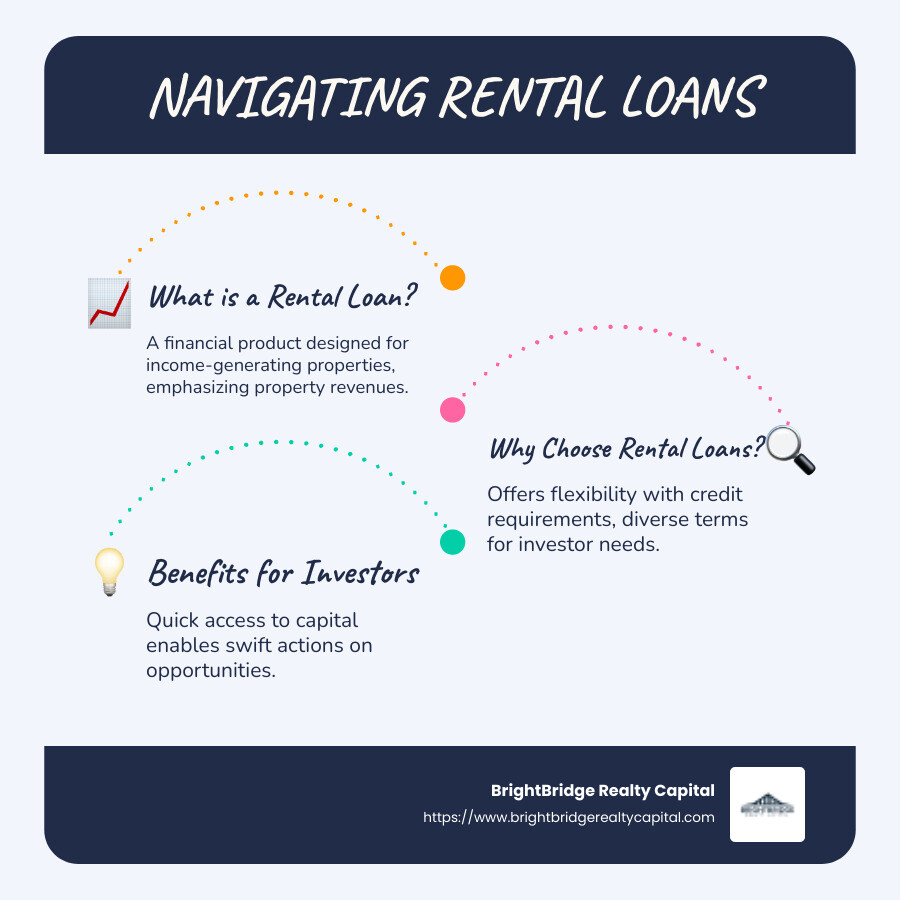Rental Loans Demystified: Your Go-To Guide

Navigating rental loan options can seem daunting, especially if you're looking to grow your investment portfolio or start a new project. To get straight to the point:
- What is a rental loan? A type of financing specifically for purchasing income-producing properties. Unlike traditional home loans, rental loans focus on revenues generated by the property.
- Why choose a rental loan? They offer flexibility with credit requirements and a range of terms to suit various investor needs.
- How can rental loans benefit investors? By providing quick access to capital, they enable swift actions on new opportunities and can support strategies like Buy, Rehab, Rent, Refinance, Repeat (BRRRR).
In the heart of New York City, BrightBridge Realty Capital understands the challenges investors face with traditional lending. Our rental loans help you bypass slow processes and open up new opportunities at competitive rates.
Rental loans are pivotal for real estate investment, offering a lifeline for those eager to generate steady income while expanding their property holdings. Whether you're considering multifamily homes, single units, or vacation rentals, securing the right loan is key to multiplying returns and minimizing risk.
Our commitment is to streamline this process so you can focus on growing your rental empire.

Understanding Rental Loans
What is a Rental Loan?
A rental loan is a specialized type of financing designed for purchasing income-generating properties. Unlike traditional home loans, which focus on the borrower's personal income and credit history, rental loans are primarily concerned with the property's ability to generate revenue. This focus allows investors to leverage the property's cash flow rather than their own financial profile.
One popular option is the Debt Service Coverage Ratio (DSCR) loan. This type of loan assesses whether a property's income can cover its debt obligations. With a DSCR of 1 or higher, the property is considered capable of servicing its debt, making it an attractive choice for investors without traditional income documentation. DSCR loans offer a flexible qualification process, often bypassing the need for personal income verification or employment history, which is a huge plus for many investors.
Types of Rental Loans
1. Conventional Loans
Conventional loans are the go-to for many investors looking to finance rental properties. These loans typically require a strong credit score and a significant down payment, often around 25%. They are suitable for investors who prefer fixed-rate terms and are comfortable with the stringent qualification criteria.
2. Jumbo Loans
For those eyeing high-value properties, jumbo loans are a viable option. These loans exceed the conforming loan limits set by Fannie Mae and Freddie Mac, allowing investors to purchase luxury or high-priced properties. While they offer the potential for larger investments, jumbo loans usually come with higher interest rates and stricter credit requirements.
3. Bridge Loans
Bridge loans provide short-term financing solutions, perfect for investors needing quick access to funds while waiting for longer-term financing or the sale of an existing property. Although bridge loans often come with higher interest rates, they offer the flexibility to act swiftly in competitive markets. They're ideal for those in transition, such as moving from a fix-and-flip to a rental strategy.
In the vibrant real estate scene of New York City, BrightBridge Realty Capital equips investors with diverse financing options to meet their unique needs. Whether you're just starting or expanding your portfolio, understanding these rental loan types can empower you to make informed decisions and seize new opportunities.
Key Features of Rental Loans
Loan-to-Value Ratios
When it comes to rental loans, understanding the Loan-to-Value (LTV) ratio is crucial. The LTV ratio represents the percentage of the property's value that a lender is willing to finance. For example, if a lender offers an 80% LTV on a rental property, they will finance up to 80% of the property's appraised value, requiring the investor to cover the remaining 20% as a down payment.
Different LTV ratios apply based on the type of transaction:
- Purchase Loans: Generally, lenders offer up to 80% LTV for purchasing rental properties.
- Rate/Term Refinance: Investors can expect LTVs up to 75% when refinancing to adjust interest rates or loan terms.
- Cash-Out Refinance: Typically, cash-out refinances have more conservative LTVs, often around 70-75%, due to the increased risk of cashing out equity.
These ratios allow investors to leverage their capital efficiently while maintaining a stake in the property, which can be crucial for managing risk and maximizing returns.
Interest Rates and Terms
Interest rates on rental loans are typically higher than those for primary residences. This is due to the increased risk associated with investment properties. Rates can vary based on several factors, including market conditions, the type of loan, and the borrower's creditworthiness.
Here’s a quick breakdown of common interest rate structures:
Fixed Rates: Offer stability with a constant interest rate throughout the loan term, making budgeting straightforward. These are ideal for those who prefer predictability.
Adjustable-Rate Mortgages (ARMs): Start with a fixed rate for a set period (like 5 or 7 years) and then adjust based on market conditions. This option can be attractive if you expect to sell or refinance before the rate adjusts.
For example, a popular option is the 5/1 ARM, which keeps a fixed rate for the first five years before adjusting annually. This can offer lower initial payments, providing flexibility for investors planning to sell or refinance in the near term.
Understanding these key features allows investors to tailor their financing strategy to align with their investment goals, ensuring they choose the best loan structure for their needs.
How to Qualify for a Rental Loan
Credit and Financial Requirements
Qualifying for a rental loan isn't just about finding the right property; it's about showcasing your financial readiness. Here's what lenders typically look for:
Credit Score: A solid credit score is crucial. Most lenders require a minimum score of 620, but a score of 740 or higher can secure better rates and terms. If your score is lower, consider strategies to boost it, like paying off debts or increasing credit lines.
Cash Reserves: Lenders want to see that you have a financial cushion. Generally, you'll need enough cash reserves to cover 3 to 6 months of mortgage payments, including principal, interest, taxes, and insurance. This demonstrates your ability to manage the property financially, even during unexpected events.
Documentation Needed
Gathering the right documentation is a key step in the rental loan process. Here’s what you’ll need:
Income Verification: Lenders require proof of a steady income to ensure you can handle monthly payments. This could include pay stubs, W-2s, or tax returns. If you're self-employed, be ready to provide additional documentation, like profit and loss statements.
Property Appraisal: An accurate appraisal of the property is essential. It not only determines the property's value but also influences the loan amount. The appraisal will assess both the market value and, in some cases, the potential rental income, which could help you qualify for the loan.
Having these documents organized and ready can streamline the application process, making it smoother and faster. By meeting these credit and financial requirements, you position yourself as a reliable borrower, increasing your chances of securing the rental loan you need.
Rental Loan Strategies for Investors
The BRRRR Method
The BRRRR method stands for Buy, Rehab, Rent, Refinance, Repeat. It's a popular strategy among real estate investors looking to build wealth through rental properties. Here's how it works:
Buy: Start by purchasing a property that needs some work. Look for undervalued properties in promising neighborhoods to maximize your potential return.
Rehab: Once you've bought the property, invest in renovations. This increases the property's value and makes it attractive to potential renters. Focus on necessary repairs and upgrades that improve rental appeal.
Rent: After rehabbing, rent out the property to generate steady cash flow. This step helps cover your mortgage and builds your income stream.
Refinance: With a tenant in place and the property's value increased, refinance the property. A cash-out refinance allows you to pull out the equity you've built through improvements. This gives you funds to invest in your next property.
Repeat: Use the cash from refinancing to buy another property, and repeat the process. This cycle helps expand your portfolio and build long-term wealth.
Refinancing Options
Refinancing is a powerful tool for investors looking to optimize their rental property financing. Here are two primary refinancing options:
Rate and Term Refinance: This option allows you to change the interest rate or loan term. If interest rates have dropped since you took out your loan, refinancing to a lower rate can save you money over time. Alternatively, adjusting the loan term can help you manage monthly payments more effectively.
Cash-Out Refinance: This strategy involves taking out a new mortgage for more than you owe on the property, allowing you to pocket the difference. Investors often use this option to access capital without selling the property. The funds can be used for various purposes, such as renovating other properties or purchasing new ones.
Both refinancing options can help investors leverage their properties more effectively. By understanding and utilizing these strategies, you can improve your rental portfolio and achieve your investment goals.
Frequently Asked Questions about Rental Loans
What are the typical interest rates for rental loans?
Rental loans often come with higher interest rates compared to loans for primary residences. This is because lenders view investment properties as riskier. Typically, rental loan interest rates can be 125 to 300 basis points higher than residential mortgage rates. For example, if the current rate for a 30-year fixed-rate residential loan is 6.75%, expect rental loan rates to range from 8% to 9.75%. The exact rate can vary based on factors like your credit score and the loan-to-value (LTV) ratio.
How much down payment is required for a rental loan?
When it comes to down payments for rental loans, expect to put down more than you would for a primary residence. Generally, lenders require a down payment of 15% to 25% of the property's purchase price. An 80% LTV is often considered ideal. However, the more you can put down, the better. A larger down payment can lead to lower interest rates and monthly payments, making the investment more manageable.
Can I get a rental loan with bad credit?
Getting a rental loan with bad credit is challenging but not impossible. Most traditional lenders prefer a credit score of 700 or higher. However, some alternative lenders may consider applicants with scores as low as 620. These non-qualified mortgage (non-QM) loans often come with higher interest rates and require larger down payments to offset the risk. If your credit is less than stellar, improving your score before applying can open up better loan options and terms.
Conclusion
When it comes to securing a rental loan, BrightBridge Realty Capital stands out as a top choice for real estate investors. We specialize in providing fast, flexible funding solutions to meet the unique needs of our clients. Our commitment to quick closings—often within a week—ensures that you can seize investment opportunities without delay.
Our direct lending approach eliminates intermediaries, allowing us to offer competitive rates and a seamless process. Whether you're looking to expand your rental portfolio or refinance existing properties, BrightBridge Realty Capital provides the expertise and speed you need to succeed.
Ready to take the next step in your real estate investment journey? Explore our loan options and find how BrightBridge Realty Capital can help you achieve your financial goals with ease and confidence.


